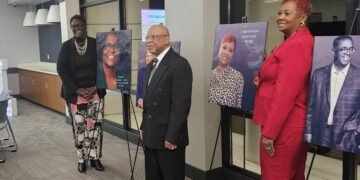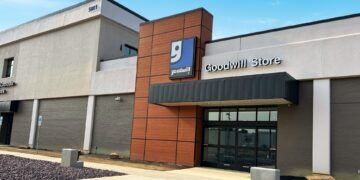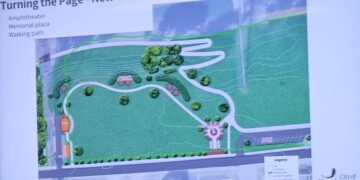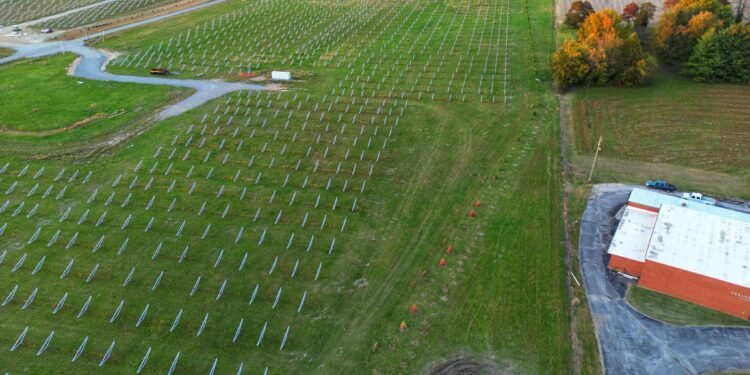The Henderson County Fiscal Court will discuss the future of green energy in the county—and the possibility of a temporary moratorium—at a special called meeting Tuesday.
Henderson County Judge-Executive Brad Schneider said the purpose of the meeting’s discussions will center on solar farms’ effects on public infrastructure.
“We’ve got to learn more about this, in my opinion, when it comes to public infrastructure,” he said.
The discussions won’t be about whether people like solar farms or not, Schneider said. A recent article in the Hendersonian detailed frustrations Robards-area residents hold about two solar farms being constructed in southern Henderson County.
The judge-executive said questions have been raised about drainage and a glare reflecting off solar panels at the two solar farms. He said these topics were not addressed in the county ordinance regarding solar farms.
He said the large solar fields in southern Henderson County could have an impact on drainage which in turn would impact county roads.
Also, the glare raises safety concerns for drivers, Schneider said.
The meeting, which will be 3 p.m. Tuesday in the Fiscal Court courtroom, is open to the public, but it’s not a public hearing, meaning public comments will not be heard.
The meeting is meant for discussion and no votes will be taken, said Deputy Judge-Executive Kurt Wiesen.
Fiscal Court may take the information gleaned from the meeting and act on it at a later meeting. Specifically, the court will determine if a 2-year moratorium on solar farms in the county needs to be implemented.
“It is an option,” Schneider said. “It is, specifically for solar farms.”
If a moratorium is put in place, the two solar farm projects headed by National Grid Renewables and NextEra Energy would continue while officials monitor their effects on drainage and glare, Schneider said. But no new solar farm projects would be started.
Schneider said the results of the monitoring could lead to changes in the county’s zoning ordinance for solar farms.
Although schneider said discussion will center on solar farms, the agenda also mentions “general discussion of green energy projects in Henderson County.”
Currently, the county has in place a battery energy storage system zoning ordinance. Also in place connected to the zoning is a safety guidelines document that the judge-executive and other zoning, emergency management and fire department officials compiled. The safety guidelines are there for planning, zoning adjustment and Fiscal Court officials to ask questions of BESS companies during the process of a system locating in the county, Schneider has said in the past.
Meanwhile, county resident James Franks said Friday he is attempting to let people know about Tuesday’s meeting. Franks lives about a mile from a BESS installation proposed by Yellowthroat Energy Storage LLC, a subsidiary of Tenaska Energy. That group has submitted plans for a BESS on a 35-plus acre parcel on Toy-Anthoston Road. He said he’s knocking on people’s doors and handing out flyers in attempts to get people to the meeting.
Franks said he wants people to be aware of the dangers of renewable energy, specifically BESS. A volunteer firefighter, he said he’s sat in on some trainings involving fires that have occurred at BESS in the country, and they are frightening. He said he’s not completely against BESS or renewable energy from locating here, but it’s got to be safe for residents.
Franks said he has three requests for BESS to locate here. He wants companies to be required to pay homeowners if property values are depleted after a BESS moves nearby. He wants to limit the acreage that green energy can locate on a particular landowner’s property. And no unsafe installations should be allowed, he said.
The Henderson-Henderson County Joint Planning Commission recently made a recommendation to the Henderson City Commission to approve zoning change on a South Green Street parcel where a BESS is planned. Henderson Municipal Power & Light General Manager Brad Bickett told the planning commission that technology surrounding BESS has improved greatly and fires at facilities are much less likely than in the past.






















